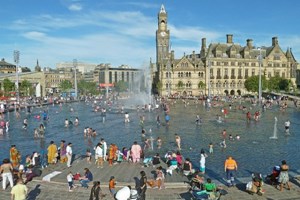
I have spent 25 years studying cities, and culture; so it was an interesting, if daunting, task to be asked to write one of the working papers for the Foresight Future of Cities project. It was a welcome opportunity to look at the ‘big picture’ that for various reasons we so rarely have the time and space to do. I am particularly glad that those commissioning the project decided to include ‘culture’. I think that 50 years ago it might not have merited a paper on its own – times change!
I really enjoyed the challenge of this paper; it was a welcome opportunity to look beyond the immediate and the necessary; and toward consideration of the bigger picture. What I had not anticipated was quite how big that picture would be. The task of looking back 50 years was a reminder; it was the start of the 1960s, teenage culture had just begun, the Beatles had their first hits; Britain was just emerging from post-war austerity, and its cities still had some way to go. But above and beyond this one is impressed looking back by how much has changed, or rather was transformed.
The usual vectors of change were evident in spades:
migration
economic growth
decline of manufacturing
urban redevelopment
But, on top of this is a dramatic change in the ways we live and work; lead perhaps by the cultural sector with its work in micro enterprises, freelance work, and project working. The field of culture has been amplified in its breath (what counts as culture), and depth (we now think of cultural production as well as consumption).
Put together all of these elements with changing political positions, governance structures, and funding streams, and mix! What is amazing is that the city is perhaps more of a focus for culture than it ever was. In spite of the siren calls of the ‘digitariat’, cities have come through emboldened and changed, but still at the centre. They are changed, the pressures and tensions are different to before and the solutions must be as well. What cities offer are a mix of the on and off-line, and a form of unplanned sociality. One can potentially ‘log off’ from online communities; however cities persist in their messy, frustrating and exciting ways. We can’t escape the consequences of our actions or those of others and we have to adapt and change in response. This is the process that will shape the future productive relationships between culture and the city.
Culture is relatively more important in cities that it ever was: it is no longer widow dressing, now it is the core business. Cities reinvent themselves in their infrastructure to accommodate and anticipate change; for culture planning soft, as well as hard, infrastructure is the ongoing challenge. In one sense we can say that the next 50 years will be much the same as the last: we will have to deal with revolutionary changes beyond current expectations.
In the scenarios that I plot out I seek to confront us with a number of dystopian outcomes. I am not concerned with the futile task of guessing future technologies or trends; rather the social and economic organisation that will shape them. Primarily, the purpose here is to concern ourselves with the risk of the downside, or the consequences of ‘business as usual’; and, on the other hand to encourage us to be bold and inventive, to plan for better, and to aspire to greatness.
If nothing else, what I think the paper shows is that it is not ‘technology’, or ‘buildings’, but people that make (culture and) cities. The challenge of governance, and the object of policy, must be to engage with this complex amalgam; a process that requires substantive understanding of the processes of change that affect the cultural sector, and its interaction with the city, its peoples and the environment. This is the main message of this paper, the need for on-going research into a (previously) neglected field that is required to fully understand and plan for our futures. This will, I hope, provide us with the analytical tools to deal with the otherwise unexpected.
Guest post by Professor Andy C Pratt.
https://futureofcities.blog.gov.uk/2014/10/23/cultural-dimension/